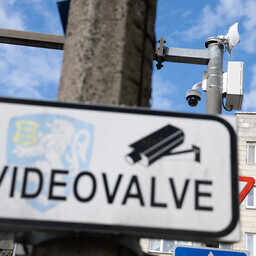Siseminister Igor Taro allkirjastas eelnõu, mis täiendab politsei- ja piirivalveseadust. Uus paragrahv annab
politseile õiguse kasutada numbrituvastuskaameraid
. Kaamerad aitavad
avastada, tõkestada ja menetleda kuritegusid
. Samuti aitavad nad
tuvastada suure ohuolukordi
, korrarikkumisi ja otsitavaid isikuid või esemeid.
politseile õiguse kasutada numbrituvastuskaameraid
Tõlge fraasile: politseile õiguse kasutada numbrituvastuskaameraid
EN
the police's right to use license plate recognition cameras
avastada, tõkestada ja menetleda kuritegusid
Tõlge fraasile: avastada, tõkestada ja menetleda kuritegusid
EN
detect, prevent, and investigate crimes
tuvastada suure ohuolukordi
Tõlge fraasile: tuvastada suure ohuolukordi
EN
identify high-risk situations
Numbrituvastuskaamerad
salvestavad fotod sõidukitest, nende haagistest, numbritest ja sõiduki läheduses viibivatest inimestest
. Kaamerad salvestavad ka
pildistamise aja ja koha
.
Andmebaasi juurdepääs jääb samaks
. Päringuid tuleb põhjendada ja logid salvestatakse kaheks aastaks.
salvestavad fotod sõidukitest, nende haagistest, numbritest ja sõiduki läheduses viibivatest inimestest
Tõlge fraasile: salvestavad fotod sõidukitest, nende haagistest, numbritest ja sõiduki läheduses viibivatest inimestest
EN
record photos of vehicles, their trailers, license plates, and people near the vehicle
pildistamise aja ja koha
Tõlge fraasile: pildistamise aja ja koha
EN
the time and location of the recording
Andmebaasi juurdepääs jääb samaks
Tõlge fraasile: Andmebaasi juurdepääs jääb samaks
EN
Access to the database remains the same
Erinevalt varasemast salvestatakse
numbrituvastuskaamerate pilte kuni 45 päeva
. Varem salvestati pilte kuni kaheks kuuks, kuid praktikas seda ei tehtud, sest piltide salvestamine on kulukas. Kui politsei peab pärast 45 päeva andmeid veel säilitama, on see võimalik.
numbrituvastuskaamerate pilte kuni 45 päeva
Tõlge fraasile: numbrituvastuskaamerate pilte kuni 45 päeva
EN
license plate recognition camera images for up to 45 days
Eelnõu ei muuda kaamerate paigutamise ega teavitamise reegleid. Politsei ei pea avalikult teavitama, kus kaamerad paiknevad. Sama kehtib ka
inimese või auto järelevalve kohta
. Politsei ei pea selleks taotlema kohtult luba. Samuti ei pea politsei teavitama inimesi, kelle numbri kohta on tehtud päringud.
inimese või auto järelevalve kohta
Tõlge fraasile: inimese või auto järelevalve kohta
EN
regarding surveillance of a person or vehicle
Riigikogu õiguskomisjoni juht Madis Timpson ütles, et seni oli
politsei kaamerate kasutamine suure privaatsusrikkega
. Nüüd tuleb olukord lahendada nii, et
privaatsus säiliks ja politsei saaks paremini turvalisust pakkuda
. «Ma tahan, et
kaamerate kasutamine oleks selgelt reguleeritud
. Ma tahan teada, kuidas pilte salvestatakse ja kui kaua neid hoitakse,» ütles Timpson.
politsei kaamerate kasutamine suure privaatsusrikkega
Tõlge fraasile: politsei kaamerate kasutamine suure privaatsusrikkega
EN
the police's use of cameras involved a significant privacy violation
privaatsus säiliks ja politsei saaks paremini turvalisust pakkuda
Tõlge fraasile: privaatsus säiliks ja politsei saaks paremini turvalisust pakkuda
EN
privacy would be preserved and the police could better ensure security
kaamerate kasutamine oleks selgelt reguleeritud
Tõlge fraasile: kaamerate kasutamine oleks selgelt reguleeritud
EN
the use of cameras would be clearly regulated
Interior Minister Igor Taro signed a draft that amends the Police and Border Guard Act. The new paragraph grants the police the right to use license plate recognition cameras. The cameras help detect, prevent, and process crimes. They also help identify major emergencies, violations of public order, and wanted individuals or objects.
License plate recognition cameras record photos of vehicles, their trailers, license plates, and people near the vehicle. The cameras also record the time and location of the capture. Access to the database remains the same. Queries must be justified, and logs are stored for two years.
Unlike before, license plate recognition camera images are now stored for up to 45 days. Previously, images were stored for up to two months, but in practice, this was not done because storing images is costly. If the police need to retain the data after 45 days, it is possible.
The draft does not change the rules for camera placement or notification. The police do not have to publicly disclose where the cameras are located. The same applies to the surveillance of a person or vehicle. The police do not need to seek court permission for this. The police also do not have to notify individuals whose license plates have been queried.
Madis Timpson, head of the Riigikogu Legal Affairs Committee, said that until now, the police's use of cameras has been a major privacy violation. Now the situation needs to be resolved in a way that preserves privacy and allows the police to provide better security. «I want the use of cameras to be clearly regulated. I want to know how images are stored and for how long they are kept,» said Timpson.

